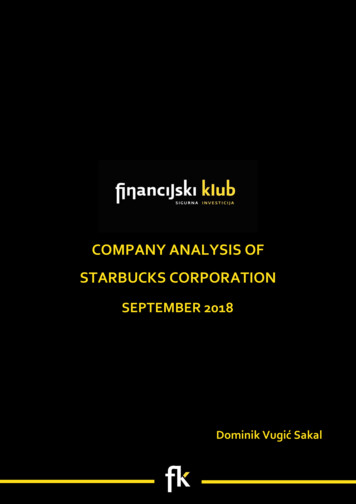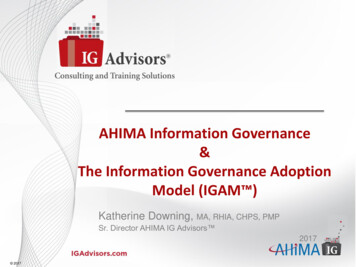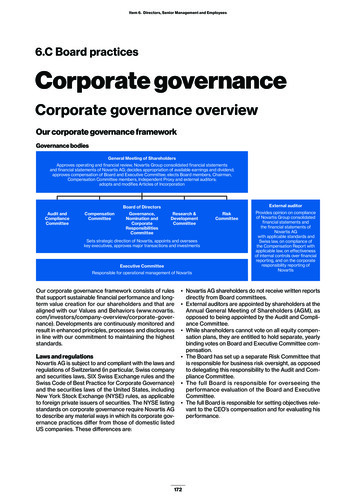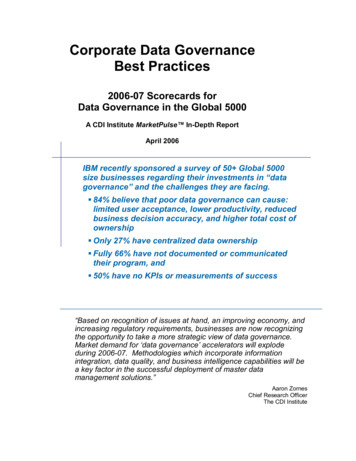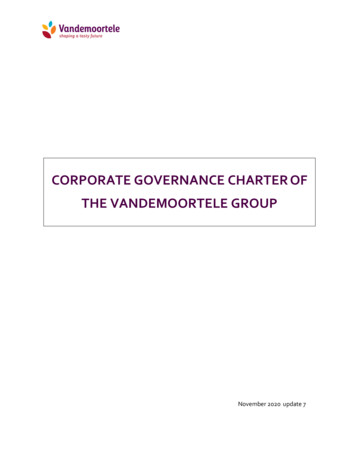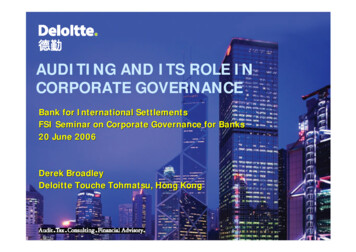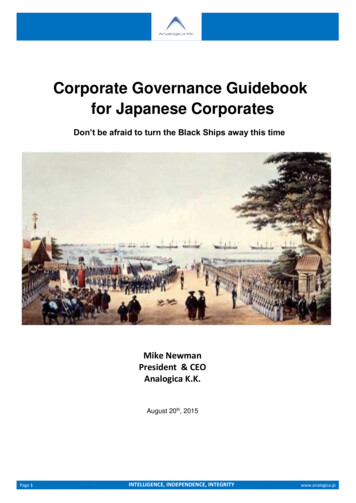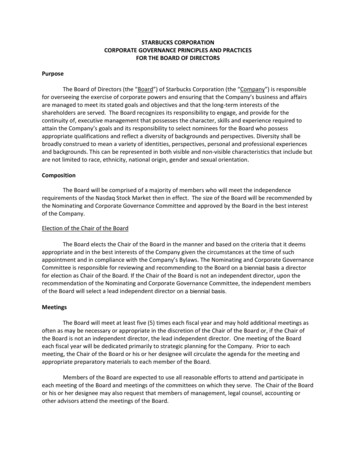
Transcription
STARBUCKS CORPORATIONCORPORATE GOVERNANCE PRINCIPLES AND PRACTICESFOR THE BOARD OF DIRECTORSPurposeThe Board of Directors (the “Board”) of Starbucks Corporation (the “Company”) is responsiblefor overseeing the exercise of corporate powers and ensuring that the Company’s business and affairsare managed to meet its stated goals and objectives and that the long-term interests of theshareholders are served. The Board recognizes its responsibility to engage, and provide for thecontinuity of, executive management that possesses the character, skills and experience required toattain the Company’s goals and its responsibility to select nominees for the Board who possessappropriate qualifications and reflect a diversity of backgrounds and perspectives. Diversity shall bebroadly construed to mean a variety of identities, perspectives, personal and professional experiencesand backgrounds. This can be represented in both visible and non-visible characteristics that include butare not limited to race, ethnicity, national origin, gender and sexual orientation.CompositionThe Board will be comprised of a majority of members who will meet the independencerequirements of the Nasdaq Stock Market then in effect. The size of the Board will be recommended bythe Nominating and Corporate Governance Committee and approved by the Board in the best interestof the Company.Election of the Chair of the BoardThe Board elects the Chair of the Board in the manner and based on the criteria that it deemsappropriate and in the best interests of the Company given the circumstances at the time of suchappointment and in compliance with the Company’s Bylaws. The Nominating and Corporate GovernanceCommittee is responsible for reviewing and recommending to the Board on a biennial basis a directorfor election as Chair of the Board. If the Chair of the Board is not an independent director, upon therecommendation of the Nominating and Corporate Governance Committee, the independent membersof the Board will select a lead independent director on a biennial basis.MeetingsThe Board will meet at least five (5) times each fiscal year and may hold additional meetings asoften as may be necessary or appropriate in the discretion of the Chair of the Board or, if the Chair ofthe Board is not an independent director, the lead independent director. One meeting of the Boardeach fiscal year will be dedicated primarily to strategic planning for the Company. Prior to eachmeeting, the Chair of the Board or his or her designee will circulate the agenda for the meeting andappropriate preparatory materials to each member of the Board.Members of the Board are expected to use all reasonable efforts to attend and participate ineach meeting of the Board and meetings of the committees on which they serve. The Chair of the Boardor his or her designee may also request that members of management, legal counsel, accounting orother advisors attend the meetings of the Board.
Minutes of each meeting will be prepared under the direction of the Chair of the Board andcirculated to each member of the Board for review and approval.Authority and Responsibilities of the BoardThe fundamental responsibility of the Company’s Board is to promote the best interests of theCompany and its shareholders by overseeing the management of the Company’s business and affairs. Indoing so, Board members have two basic legal obligations to the Company and its shareholders: (1) theduty of care, which generally requires that Board members exercise appropriate diligence in makingdecisions and in overseeing management of the Company; and (2) the duty of loyalty, which generallyrequires that Board members make decisions based on the best interests of the Company and itsshareholders, without regard to any personal interest. In discharging their responsibilities, Boardmembers must exercise their business judgment to act in a manner that they believe in good faith is inthe best interests of the Company and its shareholders. The Board believes that strong corporategovernance should include year-round engagement with the Company’s shareholders with a focus oncreating long-term, sustainable value and having high regard for the interests of all stakeholders.With respect to risk oversight, the Board views itself as having overall responsibility for riskoversight, including, as part of regular Board and committee meetings, general oversight of executives’management of risks relevant to the Company. A fundamental part of risk oversight is not onlyunderstanding the material risks a company faces and the steps management is taking to manage thoserisks, but also understanding what level of risk is appropriate for the Company. The involvement of theBoard in reviewing the Company’s business strategy is an integral aspect of the Board’s assessment ofmanagement’s tolerance for risk and also its determination of what constitutes an appropriate level ofrisk for the Company.The Board believes it is important to be deeply engaged and involved in overseeing theCompany’s long-range strategy and business initiatives and that the Company’s business strategies andprospects should be discussed as a matter of course at regular board meetings. Regular updates onsignificant items should be provided in between regular board meetings, in addition to periodic, moreintensive sessions regarding matters of corporate strategy and performance. The Chair of the Board willgenerally speak with the president and chief executive officer of the Company in between regularlyscheduled Board meetings as well.The Board has the authority to retain, at the Company’s expense, consultants, legal counsel,accounting or other advisors to assist the Board in conducting its business and meeting itsresponsibilities to the Company and its shareholders, and authority to approve such consultant’s,advisor’s or other firm’s or individual’s fees and other retention terms.Policies and PracticesThe Board is responsible for organizing its functions and conducting its business in the manner itdeems most effective and efficient, consistent with its duties of care and loyalty. To meet thatresponsibility, the Board has adopted a set of flexible policies to guide its governance practices in thefuture. These practices, set forth below, will be regularly re-evaluated by the Nominating and CorporateGovernance Committee in light of changing circumstances in order to continue serving the best interestsof all stakeholders. Accordingly, the summary of current practices is not a fixed policy or resolution bythe Board, but merely a statement of current practices that is subject to continuing assessment andchange.2
Determination of Independence of Non-Employee DirectorsNo relationship between any non-employee director and the Company should be of a naturethat could compromise the independence or judgment of any Board member in governing the affairs ofthe Company. The determination of what constitutes independence for a non-employee director in anyindividual situation will be made by the Board in light of the totality of the facts and circumstancesrelating to such situation and in compliance with the requirements of the Nasdaq Stock Market’sapplicable listing standards and other applicable rules and regulations.CommitteesThe present Board committees are the Audit and Compliance Committee, the Compensationand Management Development Committee and the Nominating and Corporate Governance Committee.All members of all committees will be non-employee directors of the Company and meet theindependence requirements applicable to membership on each committee of the Nasdaq Stock Market,applicable law, and the applicable rules and regulations of the Securities and Exchange Commission(including, with respect to audit committee membership, Section 10A(m)(3) of the Securities ExchangeAct of 1934), in each case as may be in effect from time to time. The Board considers its currentcommittee structure to be appropriate, but the number and scope of committees may be revised asappropriate to meet changing conditions and needs.The Nominating and Corporate Governance Committee is responsible for reviewing andrecommending to the Board, at least annually, the assignment of directors to various committees. TheNominating and Corporate Governance Committee will also recommend to the Board from time to timechanges in committee assignments to ensure diversity of Board member experience and to vary theexposure of the Board members to the affairs of the Company. No committee member will serveconsecutively as Chair of a committee for more than two four-year terms.The duties and responsibilities of the Board committees are set forth in their respectivecharters.Board Membership CriteriaThe Nominating and Corporate Governance Committee is responsible for, among other things,reviewing the appropriate skills and characteristics required of directors in the context of prevailingbusiness conditions and for making recommendations to the Board regarding the size and compositionof the Board. The objective is a Board that brings to the Company a variety of perspectives and skillsderived from high quality business and professional experience.Majority VotingThe Company has adopted majority voting procedures for the election of directors inuncontested elections. In an uncontested election, nominees must receive more “for” than “against”votes to be elected. The term of any director who does not receive a majority of votes cast in anelection held under the majority voting standard will terminate on the earliest to occur of (i) 90 daysafter the date election results are certified; (ii) the date the director resigns; or (iii) the date the Boardfills the position.3
Procedure for Selecting New Director CandidatesThe Board is responsible for recommending the candidates to stand for election at the annualmeeting of shareholders. The Board has delegated the screening and nomination process to theNominating and Corporate Governance Committee. The Nominating and Corporate GovernanceCommittee is expected to work closely with the Chair of the Board and the president and chief executiveofficer in determining the qualifications desired in new Board members and to select or recommendcandidates to the full Board, including any candidate recommended by the Board to stand for election atthe annual meeting of shareholders.To reflect the Company’s commitment to diversity, in connection with the use of any search firmto identify potential director candidates, the Board will require the search firm to include in its initial listof candidates qualified candidates who reflect diverse backgrounds, including, but not limited to,diversity of race, ethnicity, national origin, gender and sexual orientation.Extending the Invitation to a Potential New Director to Join the BoardUpon concurrence of the members of the Board, invitations to join the Board will be extendedto candidates on behalf of the Board by the Chair of the Board and the Chair of the Nominating andCorporate Governance Committee. Other Board members may participate as appropriate.Board Member Orientation and Continuing EducationAn orientation process is in place to acquaint new directors with the strategic plans, business,industry environment, history, current circumstances, key priorities and issues and the top managers ofthe Company. Periodic briefing sessions are also provided to members of the Board on subjects thatwould assist them in discharging their duties.Directors are also encouraged to participate in external continuing education programs, as theyor the Board determine is desirable or appropriate from time to time.Selection of Agenda Items for Board MeetingsThe Chair of the Board, together with appropriate members of management, will develop theagenda for each Board meeting. If the Chair of the Board is not an independent director, the agenda iscirculated in advance to the lead independent director. Board members may suggest additional oralternative items for consideration.Board Materials Distributed in AdvanceAs much information and data as practical relating to the meeting agenda items and theCompany’s financial performance will be sent to Board members sufficiently in advance of meetings topermit the directors to review the materials.Executive Sessions of Independent DirectorsEach Board meeting agenda will include time for an executive session with only independentdirectors present. Such executive sessions will be presided over by the Chair of the Board, ifindependent, and otherwise by the lead independent director if the Chair of the Board is notindependent. Such presiding director will also help coordinate feedback and follow-up from such4
executive sessions with the full Board, applicable Board committees, individual members of the Boardand/or senior management as appropriate.Duties of Independent Chair of the BoardIn addition to other duties set forth in these Corporate Governance Principles and Practices andthe Company’s Bylaws, the duties of the Chair of the Board include, but are not limited to, the following: Preside over and manage the meetings of the BoardSupport a strong Board culture by fostering an environment of open dialogue, effectiveinformation flow and constructive feedback among the members of the Board andsenior management, facilitating communication among the Chair, the Board as a whole,Board committees and senior management and encouraging director participation indiscussionsApprove the scheduling of meetings of the Board, lead the preparation of the agendafor each meeting and approve the agenda and materials for each meetingApprove and coordinate the retention of advisors and consultants to the BoardServe as liaison between management and independent directorsRepresent the Board at annual meetings of shareholders and be available, whenappropriate, for consultations with shareholdersAct as an advisor to the chief executive officer on strategic aspects of the businessSuc
STARBUCKS CORPORATION . CORPORATE GOVERNANCE PRINCIPLES AND PRACTICES . FOR THE BOARD OF DIRECTORS. Purpose. The Board of Directors (the “Board ”) of Starbucks Corporation (the “Company ”) is responsible for overseeing the exercise of corporate powers and ensuring that the Company’s business and affairs

